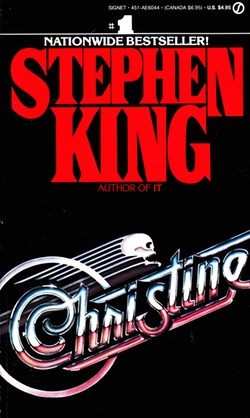A child of the 50’s, cars have long fascinated Stephen King. There’s Billy Nolan’s ‘61 Biscayne in Carrie, Jack Torrance’s clapped-out 1968 Volkswagen in The Shining, the sentient trucks of Maximum Overdrive, Cujo’s Pinto/hotbox, the killer station wagon in Mile 81, the extraterrestrial Buick Roadmaster in From a Buick 8, and the car crash that launches the plot of Misery. Cars are a part of King’s all-American palette along with denim, rock‘n’roll, and acne, so everyone expected that it was only a matter of time before a car headlined a Stephen King book. But when the book came out, everything about it was unexpected. Its deal was unusual, its setting was different, and even its quality came as a surprise. Rambling, sloppy, boring, and bloated, Christine is the book that lived up to every accusation ever leveled at King by his detractors.
The idea for Christine was hatched back in 1978 when King was walking home one day and thinking about his dying Pinto. If King had to pay royalties for inspiration, this Pinto, which he bought with the hardcover advance for Carrie, would have earned a mint by now since it also provided the intial spark for Cujo. But in 1978 his Pinto wasn’t inspiring novels, just short stories. “Wouldn’t it be funny,” King remembers thinking, “if the little numbers on the odometer started to run backwards, and that when they ran backwards the car would get younger? That would make a funny short story.” Then the 80’s happened.
Maybe it was because the 80’s were an era of out-sized excess, maybe it was because King was snorting massive quantities of cocaine and downing gallons of beer every day, maybe it was because fewer and fewer editors could tell this 10,000 pound gorilla what to cut, but before long his cute car idea was bigger than a short story, bigger than a novella, bigger even than King’s other novels. By the time it was finished, Christine would be King’s longest novel to date, after The Stand, clocking in at a whopping 526 pages.
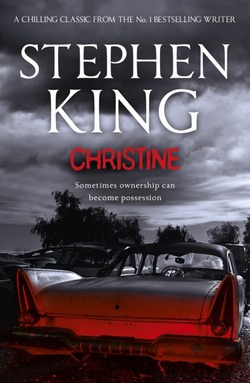 Published in 1983, the book sold 303,000 copies in its first year and King saw an awful lot of that money. Previously, he had accepted an advance from New American Library for his books, but he had become frustrated with the payment schedule. Most publishing contracts see writers paid in thirds or in quarters, meaning that they receive a quarter of their advance on signing the contract, a quarter on acceptance of the manuscript, a quarter on publication, and a quarter six months after publication. It’s only after paying off this advance that the publisher owes royalties. King’s books sold so quickly that he was usually owed royalties before his final advance payment was due, but his publishers weren’t obligated to give him his super-sized royalty check before they finished paying him his smaller advance. For Christine, King offered them a new deal: he’d take a $1 advance and a bigger share of the royalties. That way, the second a copy sold he’d be earning his royalties. It’s rare that an author can dictate terms like this, but it’s a sign of his power that both publishers rapidly agreed.
Published in 1983, the book sold 303,000 copies in its first year and King saw an awful lot of that money. Previously, he had accepted an advance from New American Library for his books, but he had become frustrated with the payment schedule. Most publishing contracts see writers paid in thirds or in quarters, meaning that they receive a quarter of their advance on signing the contract, a quarter on acceptance of the manuscript, a quarter on publication, and a quarter six months after publication. It’s only after paying off this advance that the publisher owes royalties. King’s books sold so quickly that he was usually owed royalties before his final advance payment was due, but his publishers weren’t obligated to give him his super-sized royalty check before they finished paying him his smaller advance. For Christine, King offered them a new deal: he’d take a $1 advance and a bigger share of the royalties. That way, the second a copy sold he’d be earning his royalties. It’s rare that an author can dictate terms like this, but it’s a sign of his power that both publishers rapidly agreed.
Set in Pittsburgh instead of Maine, Christine wasn’t just unusual for its location or the terms of its contract, it was also unusual because it was the first book in which King became everything people accused him of being. Cujo may be famous as the book Stephen King wrote in a drunken blackout, but it’s Christine that really feels like the work of a drunk: repetitive, bloated, clumsy, and half-baked, it’s King at his most unstoppable, his most uneditable, and his most vainglorious. Where does the super-rich author sit? Wherever he wants.
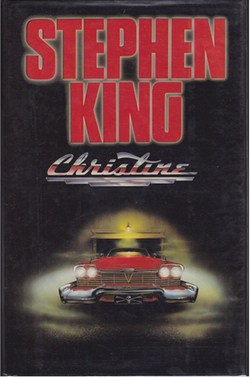 The book itself is relatively straightforward. Arnie Cunningham is a nerd with bad skin who’s a mechanical whiz, but his middle class parents are embarrassed by his passion for working on cars, envisioning him instead on a Chess-Club-to-valedictorian-to-Ivy-League-College track. His friend Dennis, who (mostly) narrates the book, is their school’s star football hero and Arnie’s best friend. One day Arnie spots Christine, a rusted-out 1958 Plymouth Fury, for sale and he impulsively buys it, much to Dennis’s and his parent’s horror. He lovingly restores it, becoming more and more obsessed with the car while simultaneously pulling away from his parents, Dennis, and even his girlfriend, Leigh. Bullies and people who get in his way are run over by the driverless Christine when Arnie is out of town, and the whole thing ends with Dennis renting a truck and smashing Christine into little bits. Oh, there’s also a subplot about cigarette smuggling that takes up about 100 pages, and Dennis spends the entire middle of the book in a body cast in the hospital.
The book itself is relatively straightforward. Arnie Cunningham is a nerd with bad skin who’s a mechanical whiz, but his middle class parents are embarrassed by his passion for working on cars, envisioning him instead on a Chess-Club-to-valedictorian-to-Ivy-League-College track. His friend Dennis, who (mostly) narrates the book, is their school’s star football hero and Arnie’s best friend. One day Arnie spots Christine, a rusted-out 1958 Plymouth Fury, for sale and he impulsively buys it, much to Dennis’s and his parent’s horror. He lovingly restores it, becoming more and more obsessed with the car while simultaneously pulling away from his parents, Dennis, and even his girlfriend, Leigh. Bullies and people who get in his way are run over by the driverless Christine when Arnie is out of town, and the whole thing ends with Dennis renting a truck and smashing Christine into little bits. Oh, there’s also a subplot about cigarette smuggling that takes up about 100 pages, and Dennis spends the entire middle of the book in a body cast in the hospital.
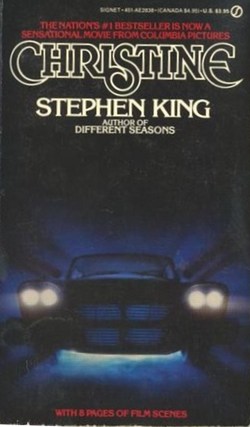 King describes Christine as “Happy Days gone mad,” with Arnie Cunningham standing in for Happy Days’s Richie Cunningham (making Dennis The Fonz), but even King admits that it fell short of his intentions. In the introduction to Four Past Midnight he writes, “When most of the reviews of Christine suggested it was a really dreadful piece of work I came to the reluctant decision that it probably wasn’t as good as I had hoped (that, however, did not stop me from cashing the royalty checks).” This kind of “take the money and run” attitude permeates the entire book right down to the fact that King sold it to the movies before it was even printed. The entire book feels rushed like that, as if King had submitted a first draft full of mistakes, repetitions, and self-indulgences instead of taking the time to clean it up. By this point in his career, some of King’s habits had become affectations, and by the time Christine came along, he had the money and the power to indulge them to the point of lunacy.
King describes Christine as “Happy Days gone mad,” with Arnie Cunningham standing in for Happy Days’s Richie Cunningham (making Dennis The Fonz), but even King admits that it fell short of his intentions. In the introduction to Four Past Midnight he writes, “When most of the reviews of Christine suggested it was a really dreadful piece of work I came to the reluctant decision that it probably wasn’t as good as I had hoped (that, however, did not stop me from cashing the royalty checks).” This kind of “take the money and run” attitude permeates the entire book right down to the fact that King sold it to the movies before it was even printed. The entire book feels rushed like that, as if King had submitted a first draft full of mistakes, repetitions, and self-indulgences instead of taking the time to clean it up. By this point in his career, some of King’s habits had become affectations, and by the time Christine came along, he had the money and the power to indulge them to the point of lunacy.
A prolific quoter of songs, King made sure that each of Christine’s 51 chapters starts with a rock n’roll lyric. The music permissions were so expensive that he had to pay for them himself (to the tune of $15,000) and their copyright info takes up three entire small-print pages. An inveterate over-writer, King takes forever to get Christine anywhere. When Arnie buys the car it takes him four chapters to drive it to the local garage (the most exciting event: he gets a flat tire). After dropping Arnie off at the garage, Dennis goes home and spends an entire chapter chatting with his dad about nothing in particular before going to bed and having a bad dream (there are a LOT of bad dreams in this book).
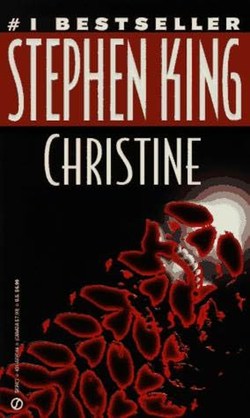 But it’s not just the length, it’s also the inconsistent characterizations. When Arnie has a massive fight with his mom, Regina, we see events through Dennis’s eyes. Over the course of three pages, Dennis describes Regina as aristocratic, then he refers to her as semi-aristocratic, then he says that she’s not aristocratic at all but like the Queen in blue jeans. Dennis claims to like Arnie’s parents, then he mocks them relentlessly and explains that he doesn’t trust Regina because she yelled at him one time and he thinks that she looks down on him, then he suddenly declares that he is in love (!) with her. Dennis repeatedly talks about how great his own mother is, but he has at least three conversations with his dad that revolve solely around mocking her aspirations to be a writer. Number of conversations with his dad in which he mentions why he likes her at all? Zero.
But it’s not just the length, it’s also the inconsistent characterizations. When Arnie has a massive fight with his mom, Regina, we see events through Dennis’s eyes. Over the course of three pages, Dennis describes Regina as aristocratic, then he refers to her as semi-aristocratic, then he says that she’s not aristocratic at all but like the Queen in blue jeans. Dennis claims to like Arnie’s parents, then he mocks them relentlessly and explains that he doesn’t trust Regina because she yelled at him one time and he thinks that she looks down on him, then he suddenly declares that he is in love (!) with her. Dennis repeatedly talks about how great his own mother is, but he has at least three conversations with his dad that revolve solely around mocking her aspirations to be a writer. Number of conversations with his dad in which he mentions why he likes her at all? Zero.
King constantly lards on the cliches. When Dennis talks about how many good times he had with Arnie’s family he reaches for hoary groaners last seen in an episode of Leave it to Beaver, “She looked at me haughtily, as if we’d never laughed together, or baked pies together, or gone on family camp-outs together.” Baked pies together? Leigh Cabot, Arnie’s transfer student girlfriend, is another bland slice of “nice girl,” like Susan Norton in ‘Salem’s Lot. Even the ending is horror cliche so tired that it’s become a punchline. Christine is destroyed, but years later Dennis reads a newspaper story about a Plymouth in California killing someone and he thinks that Christine has returned and is coming for him, working from the West Coast to the East. The End…or is it? Cue dramatic music and a big question mark on the screen.
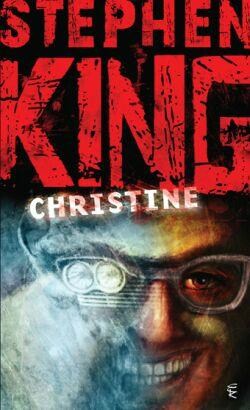 While King has always been happy to go for the gross-out description, he usually doesn’t rely on them quite so much. Here it’s as if he can’t stop himself from wallowing in long descriptions of soft human bodies being turned into road ketchup by Christine. Not content with a few scenes of automotive carnage, he resurrects the ghost of Roland LeBay, the mean old man who sold the car to Arnie then died, for no other reason than to write extended passages about LeBay’s progressive decomposition. As even King admits, LeBay is a nobody, only there because Christine needed to have an owner. Writing him was fun, so King kept writing him. “I couldn’t seem to keep him out of the book. Even after he died he kept coming back for one more curtain call, getting uglier and uglier all the time.” With Carrie, King made it clear in interviews that there were characters who “got out of hand” and had to be trimmed back, but with Christine there was no reason to be disciplined. After all, wasn’t he Stephen King, international bestselling author and literary rock star?
While King has always been happy to go for the gross-out description, he usually doesn’t rely on them quite so much. Here it’s as if he can’t stop himself from wallowing in long descriptions of soft human bodies being turned into road ketchup by Christine. Not content with a few scenes of automotive carnage, he resurrects the ghost of Roland LeBay, the mean old man who sold the car to Arnie then died, for no other reason than to write extended passages about LeBay’s progressive decomposition. As even King admits, LeBay is a nobody, only there because Christine needed to have an owner. Writing him was fun, so King kept writing him. “I couldn’t seem to keep him out of the book. Even after he died he kept coming back for one more curtain call, getting uglier and uglier all the time.” With Carrie, King made it clear in interviews that there were characters who “got out of hand” and had to be trimmed back, but with Christine there was no reason to be disciplined. After all, wasn’t he Stephen King, international bestselling author and literary rock star?
It’s not just King’s indulgence of his own worst tendencies that undermines Christine, it’s his basic execution, which is as sloppy as a pie-eating contest. King tends to think through the backstory of everyone in his books, even down to the mailman in Cujo who appears in two scenes, and has nothing to do with the plot. And yet when the producers of the movie version of Christine called to ask if the car was born bad or became bad later he replied, “I don’t know. You can do whatever you want.” The book is even sloppy on a sentence-by-sentence level, as when Chapter Two starts with the malapropism, “It was a decision I repented very quickly.”
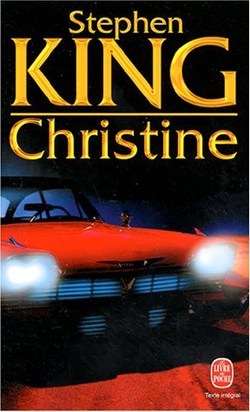 The worst sin of all is the stitched-together, Frankenstein’s monster quality of Christine. The first 166 and the last 121 pages are narrated in first person by Dennis, but then he gets injured and spends a long time in the hospital in traction, leaving the middle 186 pages to be narrated in the third person. It’s jarring, and King says it was an imperfect solution to a writing problem. He says that he found himself stuck when Dennis got injured and had to be removed from action. After trying a bunch of different solutions, he just decided to narrate it in third person. “It almost killed the book,” he later admitted.
The worst sin of all is the stitched-together, Frankenstein’s monster quality of Christine. The first 166 and the last 121 pages are narrated in first person by Dennis, but then he gets injured and spends a long time in the hospital in traction, leaving the middle 186 pages to be narrated in the third person. It’s jarring, and King says it was an imperfect solution to a writing problem. He says that he found himself stuck when Dennis got injured and had to be removed from action. After trying a bunch of different solutions, he just decided to narrate it in third person. “It almost killed the book,” he later admitted.
Some people have claimed that King writes “literary junk food,” which is snobby and dismissive. There is nothing that even remotely resembles junk food in the desperate hunger to be accepted of Carrie, the brutal self-examination of The Shining, the experimentation of The Dead Zone, the resigned exploration of fate and coincidence in Cujo, or the righteous anger and sadness of “The Body.” But Christine is junk food all the way through: super-sized, greasy, messy, and ultimately leaving you empty and unsatisfied. It’s one of the few Stephen King books that is just all wrong, from start to finish.
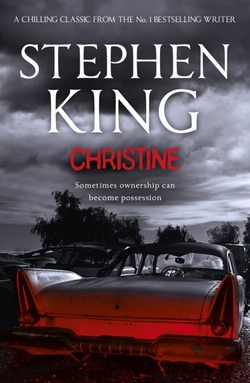 Even the book jacket is wrong. For his author’s photo, King decided to pose with Christine. He rented what he thought was a 1958 Plymouth Fury, but it turned out to be a 1957 Plymouth Savoy instead. Did King make a correction? Nah, there was so much coke to snort, so much beer to drink, so many publication deadlines to meet, and so many checks to cash, that he didn’t seem to care about putting a glaring error on the back cover of his book. That sound you hear? It’s Stephen King laughing all the way to the bank. That other sound? It’s his reputation taking a beating.
Even the book jacket is wrong. For his author’s photo, King decided to pose with Christine. He rented what he thought was a 1958 Plymouth Fury, but it turned out to be a 1957 Plymouth Savoy instead. Did King make a correction? Nah, there was so much coke to snort, so much beer to drink, so many publication deadlines to meet, and so many checks to cash, that he didn’t seem to care about putting a glaring error on the back cover of his book. That sound you hear? It’s Stephen King laughing all the way to the bank. That other sound? It’s his reputation taking a beating.
Grady Hendrix has written about pop culture for magazines ranging from Playboy to World Literature Today. He also writes books! You can follow every little move he makes over at his blog.










